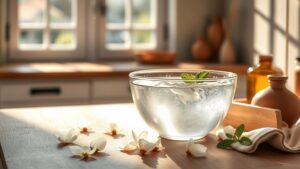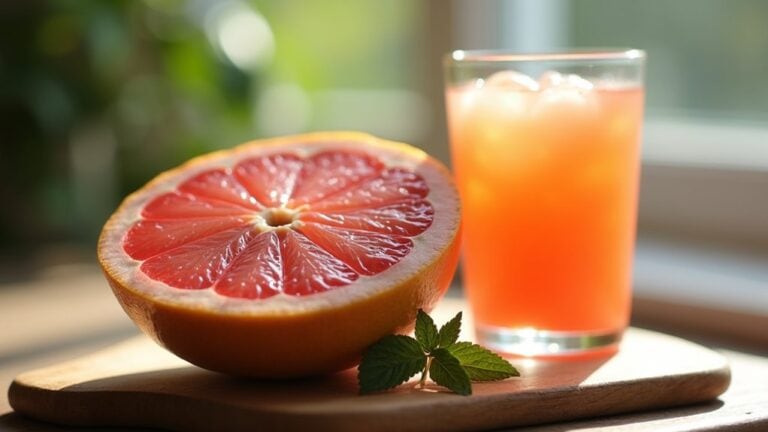Have you ever noticed the radiant hair of a geisha or the clear skin of a noblewoman from centuries past? They often owed their beauty to rice water, an age-old secret that’s getting a second look today. Packed with nutrients that nourish, this magical elixir can strengthen your hair and soothe your skin. Curious about how to incorporate this timeless remedy into your daily routine? Let’s investigate the marvels of rice water together.
The Rich History of Rice Water in Beauty
When you contemplate beauty rituals, rice water mightn’t be the initial thing that comes to mind, but it has a rich history that’s just as fascinating as it’s effective. For centuries, rice has been a beauty secret among women, especially the Yao women in Huangluo village.
They’ve maintained their stunning six-foot hair through soaking it in rice water weekly for over 1,000 years! In the Tang Dynasty, noblewomen used fermented rice water for shinier, stronger hair.
Japanese court ladies bathed in it, while ancient Koreans washed their faces to boost complexion clarity. The use of rice water in hair products isn’t just a modern trend; it’s rooted in centuries of personal care practices that truly made a difference.
Nutritional Composition That Benefits Hair and Skin
Rice water isn’t just a timeless beauty ritual; its nutritional composition plays a significant role in enhancing both hair and skin health. This starchy liquid is packed with beneficial components that can truly elevate your beauty routine.
- Amino acids like cysteine and methionine strengthen hair keratin and enhance elasticity.
- Inositol, especially in fermented rice water, repairs damaged hair cuticles and adds shine.
- Vitamins B, including B1 and niacinamide, improve scalp health and soothe inflammation.
- Antioxidants such as ferulic acid protect your skin from UV damage and aid collagen production.
The minerals in rice water, like magnesium and selenium, also fortify hair follicles and balance scalp oil. Embracing rice water could be your new beauty secret!
Methods for Preparing Rice Water at Home
Ready to unleash the advantages of rice water for your hair and skin?
You can easily prepare it at home using a few simple methods.
We should discover the soaking and fermentation processes that’ll help you create this natural remedy in no time.
Soaking Rice Method
Provided you aim to improve your hair and skin health, employing the soaking method for rice water is a straightforward yet efficient approach. Here’s how to do it:
- Rinse ½ cup of plain white rice to remove any impurities.
- Soak the rice in 2–3 cups of water for at least 30 minutes to allow nutrient release.
After soaking, strain the liquid into a clean airtight container, discarding the rice or using it for cooking.
The resulting milky water is rich in starch, vitamins B and E, and amino acids like cysteine, all beneficial for hair and skin.
Storing the rice water in the refrigerator will keep it effective for up to a week, ensuring you can easily boost it into your beauty routine!
Fermentation Process Steps
Preparing rice water via fermentation can boost your beauty regimen, particularly while focusing on the health of your hair and skin. Begin by soaking 1 cup of uncooked white rice in 2 cups of purified water for about 30 minutes. Strain this mixture to get your base.
To ferment, pour the rice water into a sealed container and let it sit at room temperature for 24 to 48 hours. This encourages beneficial bacteria, lowering the pH for better absorption.
In case you’re short on time, consider accelerated fermentation by adding a tablespoon of sugar or a probiotic capsule, cutting the wait to just 12 hours.
Finally, you could investigate a dual-phase prep that combines soaking, boiling, and fermenting for a nutrient-rich treatment.
Scientific Evidence Supporting Rice Water’s Efficacy
Let’s take a closer look at why rice water is so effective for your hair and skin.
Studies show its rich nutrient composition can improve elasticity and reduce damage, helping you achieve that silky shine you’ve always wanted.
Plus, it’s been validated over time, proving that these benefits are more than just old wives’ tales.
Nutrient Composition Analysis
Have you ever pondered why rice water has gained so much attention for hair and skin care? The secret lies in its nutrient composition, scientifically backed for its benefits.
Rice water contains inositol, which penetrates hair to strengthen elasticity. Additionally, it’s packed with vitamins B, enhancing hair health and moisture retention.
Fermented rice water exhibits a pH that mirrors your scalp’s natural acidity, sealing cuticles and reducing frizz.
Here are some key ingredients to create a potent beauty elixir:
- Amino acids like cysteine and methionine fortify hair structure.
- Increased vitamin B5 from fermentation enhances hydration.
- Ferulic acid levels rise in fermented rice water, providing UV protection.
- Active ingredients nourish both hair and skin, making rice water an essential beauty ally.
Historical Effectiveness Validation
While many beauty products come and go, the effectiveness of rice water for hair and skin has stood the test of time, with scientific studies supporting its use. The practice originated in ancient Japan, where women with floor-length hair relied on rice water treatments. Historical effectiveness is now validated by science. Research highlights include:
| Study | Key Finding | Year |
|---|---|---|
| International Journal | Fermented rice water improves hair elasticity through 77% | 2010 |
| Journal of Dermatology | Inositol in rice water reduces breakage through 55% | 2016 |
| Korean Society | Fermented rice water’s pH aids moisture retention | 2021 |
| Cosmetics | Rice starch reduces friction damage through 40% | 2022 |
These findings confirm that rice water contains powerful properties to strengthen hair fibers and elevate your beauty routine.
Best Practices for Using Rice Water in Your Routine
Once you’re ready to incorporate rice water into your beauty routine, grasping the best practices can make all the difference in achieving stunning results for your hair and skin. Here’s how to use rice water effectively:
- Store it in an airtight container in the fridge and use it within a week.
- Apply rice water as a post-shampoo rinse, massaging it into your scalp for 5–20 minutes before rinsing with cool water.
- Use it 1–2 times a week, adjusting based on your hair type—once for dry hair and 2–3 times for oily hair.
- Avoid fermented rice water on sensitive scalps unless diluted with water or aloe vera.
Keeping these tips in mind will help you enjoy healthy hair and promote hair growth!
Potential Risks and Side Effects of Rice Water
Using rice water can be a marvelous addition to your hair and skincare routine, but it’s crucial to stay aware of potential risks and side effects. Overusing rice water could lead to protein overload, causing your hair to become stiff and brittle.
Should you store rice water for more than three to four days without refrigeration, it may collect bacteria, increasing the risk of scalp infections. The starchy residue can lead to buildup on your scalp, worsening flakiness or clogging hair follicles.
In case your skin is sensitive, undiluted rice water could irritate it, and you might also experience temporary hair darkening from the starch coating. Keeping these factors in mind can help you enjoy rice water’s benefits safely and effectively!
Customizing Rice Water for Different Hair and Skin Types
Tailoring rice water to suit your specific hair and skin type can reveal its full potential, making it an even more powerful part of your beauty routine.
Here are some quick customization tips for effective hair care and scalp care:
- For dry hair, mix rice water with coconut oil in a 1:1 ratio to enhance moisture.
- Oily scalps benefit from adding five drops of tea tree oil per cup of fermented rice water for antibacterial action.
- Provided you have sensitive skin, dilute rice water with three parts distilled water to minimize irritation from amino acids.
- Combination skin thrives whenever you blend rice water with aloe vera gel in a 2:1 ratio for balanced hydration in oily areas and drier zones.





